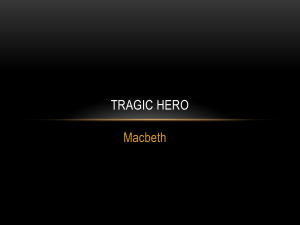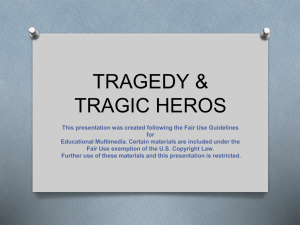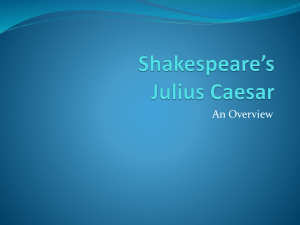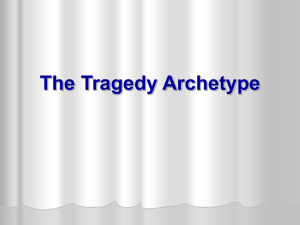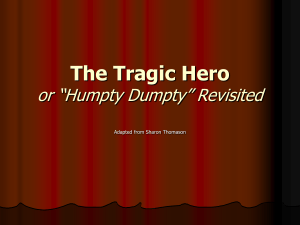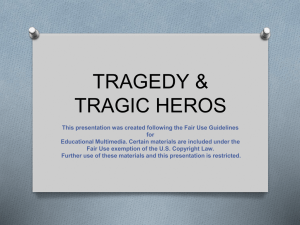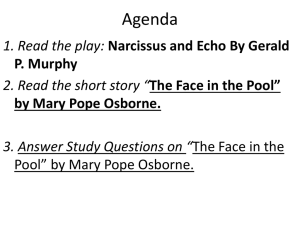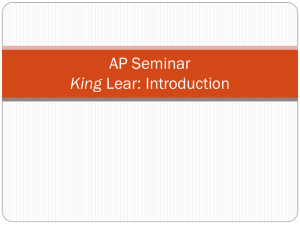Shakespearian Tragedy
advertisement
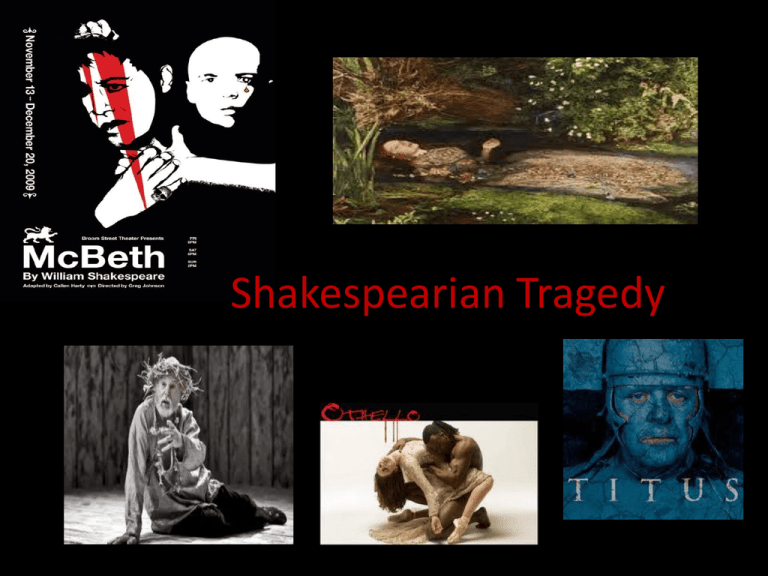
Shakespearian Tragedy Classical Tragedy: Aristotle's Poetics • a protagonist of high estate ("better than we") • Falls from prosperity to misery • Reversals and discoveries ="tragic flaw" – error caused by human frailty • Basically a good person • The action (or fable) generally involves revolution (unanticipated reversals of what is expected to occur) + Discovery (in which the protagonists and audience learn something that had been hidden) • The third part of the fable = disasters : includes all destructive actions, deaths, etc. • Tragedy evokes pity and fear in the audience, leading finally to catharsis (the purgation of these passions) Medieval Tragedy: • • • • • A narrative (not a play) falls from high to low estate The Goddess Fortune spins her wheel In the middle ages = no "tragic" theater per se Primarily liturgical drama (religious) – teaching scripture to the illiterate (mystery plays) – reminding them to be prepared for death and God's Judgment (morality plays) Renaissance Tragedy • Mix of both medieval tragedy (which randomly occurs as Fortune spins her wheel) and from the Aristotelian notion of the tragic flaw, a moral weakness or human error that causes the protagonist's downfall • Unlike classical tragedy, however, it tends to include subplots and comic relief • Early Renaissance = "violent and bloody plots, resounding rhetorical speeches, the frequent use of ghosts . . . and sometimes the five-act structure" – (Norton Anthology of English Literature, 6th ed., vol. I, p. 410) • In his greatest tragedies (e.g. Hamlet, Othello, King Lear and Macbeth), Shakespeare transcends the conventions of Renaissance tragedy, imbuing his plays with a timeless universality Great Chain of Being • • • • • Shakespeare's Time Believed in the Great Chain of Being Determined natural order of events Series of hierarchical links – God on top Each level had own hierarchy Disruption of hierarchy = disrupt the laws of nature – Causes bizarre events to occur Great Chain of Being • • • The Great Chain of Being has six levels Starting with the highest level, God, who is all spirit and no matter to the bottom level which is inanimate objects that have all matter and no spirit. Each level is subdivided into stations – – – • – – – God Angels Humans • Kings/Queens • Duke/Duchess/Thanes • Bishops • Earls/Local Clericals • Priests/Monks • Managers • Merchants/Shopkeepers • Tradesmen • Farmers • Soldiers/Town Watch • Household Servants • Beggars • Actors • Thieves/Pirates • Gypsies Animals Vegetables Minerals Great Chain of Being Great Chain of Being Two Important Points 1. Divine Right of Kings: basically certain people are Kings because God specifically wanted them to be King. • Note the proximity of Kings to God 2. You cannot move from your station. – For example, if you are born poor you remain poor. – King Lear disturbed the Great Chain of Being – He removed the ‘God chosen King’ and replaced him with himself – Shakespeare, through King Lear, uses this point to demonstrate part of the conflict/theme • his ambition dominating over human nature • It goes against human nature to disrupt the chain Great Chain of Being Great Chain of Being • Shakespeare Plays = when the chain was disturbed then the flow of nature was disturbed – when people move out of their rightful place on the Chain of Being, the whole of Nature is upset and in turmoil – – This is the theme of so many of his plays-when the rightful king is displaced Nature cannot function properly until things are put right • It helps to explain why strange things were happening during the murder Element 1 The Tragic Hero Tragic Hero? Act III Act IV Act II Act I Act V Only One Tragic Hero #1: Man of High Estate – a king, prince, general, etc. – we will hear about him from others before he makes an entrance in the play Man of High Estate His fate affects the welfare of a whole nation or empire • Powerlessness of man • Omnipotence of Fate or Fortune THEY ARE EXCEPTIONAL BEINGS • Being of high estate is not everything • Hero's nature is exceptional – raises him in some respect much above the average level of humanity – intensification • Fatal gift = touch of greatness =Virtue – Fierce determination, fixed ideas – Mixed with nobility of mind, or genius, or immense force • Stirs not only sympathy and pity, but admiration, terror, and awe. #2 Tragic Flaw/Virtue • A ‘Flaw’ in Character • Virtue: – Two sides of one coin – That which is BEST quality turns into his WORST/FATAL quality – Misapplied TRAGIC Virtue • Obsession – driving force • Virtue = Driving force within the hero • The flaw often takes the form of obsession – this tragic trait, which is also his greatness, is fatal to him • He errs by action or omission • Inner torment as he follows his obsession • His error + other causes = his ruin/downfall #3 Intrusion of Time and a Sense of Urgency • • • • Inner / outer conflicts intensify Time becomes more and more important A sense of urgency (haste) develops Plot / conflict creates tension – steamrolling inevitability effect – Downfall of hero's – He has put into motion himself # 4 Misreading and Rationalizations – Contributing to, and furthering the obsession and the control of the tragic flaw/virtue are misreadings, supernatural suggestion, and accident or chance – Things happen a split second too late • the hero operates on what he believes to be the case • rather than what he actually knows to be the case • Soon they are one and the same thing to him # 5 Murder, Exile, Alienation of Enemies and Allies • Conflicts arise • death or alienation of all of the hero's former friends, allies, and/or mentor • Removing all forms of support for the hero • He must face things alone #6 Gradual Isolation of the Tragic Hero • Soon the hero is isolated • Brings on new problems: – Sleeplessness – Rage – Confusion – Hallucination – violence # 7 Mobilization of the Opposition • At some point, the opposing forces must mobilize against the hero in order to bring the tragedy to its conclusion. # 8 Tragic Recognition of the Flaw by the Tragic Hero: Too Late • Tragic hero must realize the error/mistake he has made that is bringing about his fall • He must accept that he alone is to blame for his downfall • However, this tragic recognition always comes to late to save the life of the hero #9 Last, Courageous Attempt to Restore Lost Honor/Greatness • While the hero's life is forfeit, he does, after Tragic Recognition, receive some chance to redeem himself - at least a little – A display of courage – Nobility of the heart – Self-sacrifice • Something to show us that while he was someone who needed to be defeated, brought down, or even a monster, he had good in him # 10 Audience Recognizes Potential for Greatness • This is inevitably tied to the hero's attempt to restore his greatness - # 9 • The audience must recognize what a tragic waste the death of the hero is – What kind of person he could have been had it not been for his mistakes and downfall # 11 Death of the Tragic Hero • It is a tragedy after all # 12 Restoration of Order • The natural order of The Great Chain of Being is restored Aristotle Hero Aristotle once said that "A man doesn't become a hero until he can see the root of his own downfall." An Aristotelian tragic hero must have four characteristics: 1. Nobility: (of a noble birth) or wisdom (by virtue of birth). 2. Hamartia: (translated as flaw, mistake, or error) 3. Peripetia: A reversal of fortune (peripetia) brought about because of the hero's Hamartia (or tragic virtue). 4. Anagnorisis: The discovery or recognition that the reversal was brought about by the hero's own actions (anagnorisis). TRAGEDY, HUMAN FLAWS, & RESPONSIBILITY Proairesis- The freedom of choice at the end; the degree to which the Tragic Hero is “free” to choose – rational decision • The calamities of tragedy do not simply happen, nor are they sent = – The calamities of tragedy proceed mainly from actions, and those, the actions of men • Shakespeare's tragic heroes are responsible for the catastrophe of their falls. • The hero always contributes in some measure to the disaster in which he perishes
